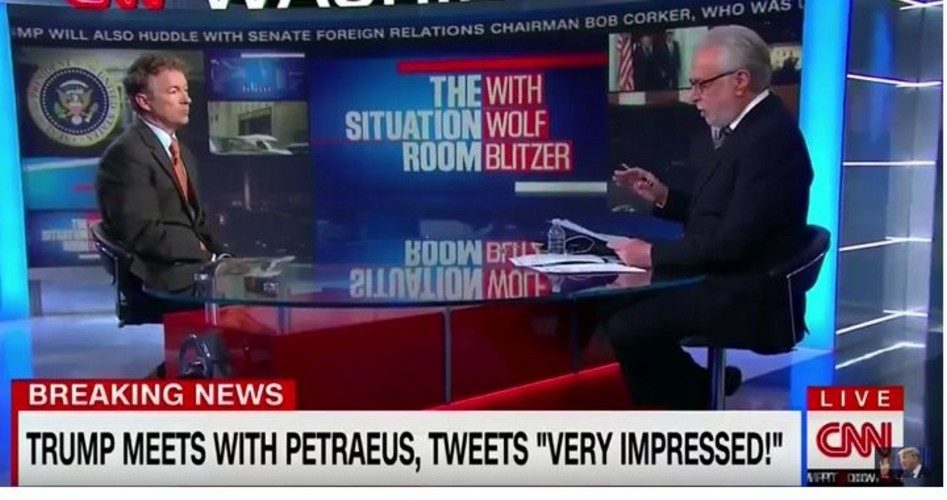
Senator Rand Paul (R-Ky.), often described as a “libertarian-leaning” Republican, has expressed strong misgivings about several individuals named as being among President-elect Donald Trump’s likely candidates to be secretary of state.
Speaking on November 27 on NBC News’ Meet the Press, Trump’s chief of staff Reince Priebus provided some names of potential nominees for the important cabinet post: “I’m not sure who he’s going to select, but I do know that he’s talking to the right people: Giuliani, General [Jack] Keane, General [John] Kelly; he’s talked to Mitt Romney, obviously.”
CBS News named former New York City mayor Rudy Giuliani as one of the top contenders, but other possible picks include 2012 Republican presidential nominee Mitt Romney, former CIA Director, General David Petraeus, and Tennessee Senator Bob Corker.
During an interview on CNN’s The Situation Room with Wolf Blitzer on November 28, Paul spoke his mind concerning Trump’s potential nominees to the secretary of state position. Blitzer turned the conversation to the subject of who Paul would prefer to head State, and the interview proceeded as follows:
Blitzer: Let’s talk about Mitt Romney right now. He’s going to have a second meeting tomorrow night, dinner they’re going to have in New York City with the president-elect. You’ve said Romney would be, in your words, “an even keel pick.” You obviously want Romney to be selected as secretary of state, given the options, right?
Paul: Well, I wouldn’t put it that way. What I want is somebody who understands that the Iraq War was a mistake, that nation building has been a mistake, and that regime change has been a mistake. These are things that Donald Trump has expressed, and I believe and agree with completely. That’s why I supported him.
But I don’t believe [John] Bolton, I don’t believe Giuliani have understood that or have come to understand the historical significance of that. I’m unsure about where Romney is on this, and if he comes before my committee, I would ask him, “Do you now understand the Iraq War was a mistake and made us less safe, emboldened Iran, made the whole situation more chaotic?”
Because if we don’t understand those lessons, we’re still facing the same kind of questions. Should we topple Assad in Syria? Should we have regime change and nation building?
I think it’s also connected to Donald Trump’s domestic policy. He wants to build infrastructure. If you’re going to build a nation in Afghanistan and Syria and Iraq and you’re going to build their roads or pave their roads, there’s not enough money left to pave our roads. So there is somewhat of a choice in foreign policy that will also affect our domestic policy.
Blitzer: Just to recap, you don’t think you could support Giuliani, you don’t think you could support U.N. ambassador John Bolton. What about retired General Petraeus?
Paul: You know, I think the problem they are going to have if they put him forward is there’s a lot of similarities to Hillary Clinton as far as revealing classified information.
One, is that a good thing, to have a high-ranking person reveal classified information? And also, the similarities. I mean, they spent a year and a half beating up Hillary Clinton over revealing classified information, and then they would appoint somebody who the FBI says not only revealed it but then lied about it in an interview, and purposely gave it to someone who did not have the clearance to have that? I think that’s a potential problem. But I think…
Blitzer: He pleaded guilty to that charge.
Paul: And pleaded guilty to it. I think part of the guilty plea, though, has to do with holding higher office. I’m not a lawyer, but I think if you look at the statute on there, there may be a provision that says you may or may not be able to hold office.
Blitzer: There’s also a provision that says the president of the United States can grant security clearance, basically, to anyone he wants.
Paul: Yes, there’s going to be some questions asked, I think, if that were the conclusion. But to my mind, what’s most important is I want Donald Trump to pick someone who agrees with Donald Trump. Donald Trump said nation building was a problem, regime change was a problem, the Iraq war was a mistake. I want someone who fully understands that.
Blitzer: But bottom line, who do you want?
Paul: I don’t have a pick that I’m putting out as anybody. What I want is someone who understands the historical significance of the failure in Iraq and that we don’t repeat it.
The following day, speaking to reporters, Paul questioned how Senate Republicans could, “with a straight face,” consider confirming former Petraeus as secretary of state.
A report in Business Insider noted that Petraeus pleaded guilty in 2015 to a misdemeanor charge of mishandling classified information and that Trump and fellow Republicans strongly criticized Democratic presidential nominee Hillary Clinton during the recent presidential campaign for doing what he claimed was worse while she was secretary of state.
“I think there’s going to be the problem that everything we complained about with Hillary Clinton revealing emails that were classified or not treating them appropriately are the same issues for Petraeus,” said Paul. “So I don’t know how we can, with a straight face, say, ‘Oh, we’re going to appoint someone to a cabinet position who actually pled guilty to a similar offense.’ ”
While the heavily publicized accusations leveled against Clinton during the campaign for her mishandling of classified information by using her own private e-mail server for official communications, rather than official State Department e-mail accounts maintained on federal servers invite a comparison with Petraeus, there are many other concerns that Paul and other critics of our government’s interventionist policies in the Middle East should have about the former general and CIA director.
As The New American reported several times during and after Petraeus’ tenure as commander of the International Security Assistance Force (ISAF) — the NATO-led mission in Afghanistan — the general was a key player in carrying out our intervention in Afghanistan and the region. As a member of the internationalist Council on Foreign Relations (CFR), he was always ready to carry the ball for those advancing America’s interventionist foreign policy. The New American’s foreign correspondent, Alex Newman, noted in a June 2014 article, “’After America Comes North America,’ Gen. Petraeus Boasts”:
Former general and CIA chief David Petraeus … a key figure in the globalist Council on Foreign Relations and the shadowy Bilderberg network, boasted at a recent conference that the United States of America is set to be merged into the continental regime being erected under the North American Free Trade Agreement (NAFTA).
The article quoted a statement that Petraeus made at the Margaret Thatcher Conference on Liberty in London in June 2014 that could be viewed as a celebration of the end of U.S. independence. “After America comes North America,” Petraeus said in answering the question about what comes after the United States, the theme of the panel discussion. “Are we on the threshold of the North American decade, question mark? I threw that away — threw away the question mark — and boldly proclaimed the coming North American decade, says the title now.” Petraeus also boasted about how the three economies of Canada, the United States, and Mexico have been put “together” over the last 20 years as part of the “implementation” of the North American Free Trade Act (NAFTA).
Much more could be written about Petraeus’ lengthy service to his internationalist colleagues at the CFR. In comparison, his admitted transgressions involving mishandling classified information amount to exactly what they were classified as — a misdemeanor.
Paul said that in considering the type of candidate for secretary of state he might support, “What I want is somebody who understands that the Iraq war was a mistake, that nation building has been a mistake, and that regime change has been a mistake.”
He has stated, “I don’t believe Bolton, I don’t believe Giuliani have understood that, or have come to understand the historical significance of that. I’m unsure about where Romney is on this, and if he comes before my committee I would ask him ‘do you now think the Iraq war was a mistake, and made us less safe, emboldened Iran, made the whole situation more chaotic?’ ”
Paul did not mention Petraeus in that statement, but in 2003, Petraeus, then a major general, commanded the 101st Airborne Division during V Corps’s drive to Baghdad. While admittedly, in that position, Petraeus served in a policy-implementing rather than a policy-creating role, it would be interesting to see how he would answer the question about the Iraq War that Paul proposed asking Romney.
Related articles:

